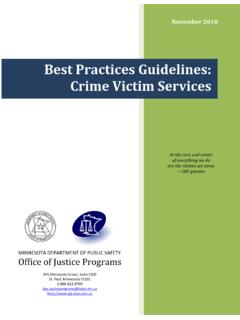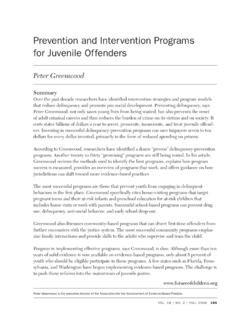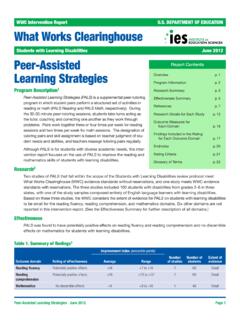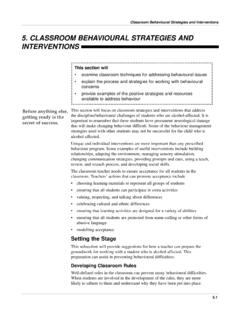Transcription of Law Enforcement Traumatic Stress: Clinical Syndromes and ...
1 Law Enforcement Traumatic Stress: Clinical Syndromes and intervention strategies by Laurence Miller, INTRODUCTION. Every time we dial 911, we expect that our emergency will be taken seriously and handled competently. The police will race to our burgled office, the firefighters will speedily douse our burning home, the ambulance crew will stabilize our injured loved one and whisk him or her to the nearest hospital. We take these expectations for granted because of the skill and dedication of the workers who serve the needs of law Enforcement , emergency services, and public safety.
2 These "tough guys" (Miller, 1995) - the term includes both men and women are routinely exposed to special kinds of Traumatic events and daily pressures that require a certain adaptively defensive toughness of attitude, temperament, and training. Without this resolve, they couldn't do their jobs effectively. Sometimes, however, the stress is just too much, and the very toughness that facilitates smooth functioning in their daily duties now becomes an impediment to these helpers seeking help for themselves. This article first describes the types of critical incidents and other stresses experienced by law Enforcement personnel.
3 Many of these challenges affect all personnel who work in public safety and the helping professions, including police officers, firefighters, paramedics, dispatchers, trauma doctors, emergency room nurses, and psychotherapists (Miller, 1995, 1997, 1998a, 1998b, 1999, in press); however, the focus here will be on the stressors most relevant to police officers, criminal investigators, and other law Enforcement personnel. Secondly, this article will describe the critical interventions and psychotherapeutic strategies that have been found most practical and useful for helping cops in distress.
4 The target audience for this article is a dual one. This article is for law Enforcement supervisors and administrators who want to understand how to provide the best possible psychological services to the men and women under their command. It is also for mental health clinicians who may be considering law Enforcement consultation and therefore want some insight into the unique challenges and rewards of working with these personnel. STRESS AND COPING IN LAW Enforcement . Police officers can be an insular group, and are often more reluctant to talk to outsiders or to show "weakness" in front of their own peers than are other emergency service and public safety workers.
5 Officers typically work alone or with a single partner, as opposed to firefighters or paramedics, who are trained to have more of a team mentality (Bla u, 1994; Cummings, 1996; Kirschman, 1997; Reese, 1987; Solomon, 1995). This presents some special challenges for clinicians attempting to identify and help those officers in distress. The Patrol Cop Even those civilians who have no great love for cops have to admit that theirs is a difficult, dangerous, and often thankless job. Police officers regularly deal with the most violent, impulsive, and predatory members of society, put their lives on the line, and confront cruelties and horrors that the rest of us view from the sanitized distance of our newspapers and TV screens.
6 In addition to the daily grind, officers are frequently the target of criticism and complaints by citizens, the media, the judicial system, adversarial attorneys, social service personnel, and their own administrators and law Enforcement agencies (Blau, 1994). Police officers generally carry out their sworn duties and responsibilities with dedication and valor, but some stresses are too much to take, and every officer has his or her breaking point. For some, it may come in the form of a particular Traumatic experience, such as a gruesome accident or homicide, a vicious crime against a child, a close personal brush with death, the death or serious injury of a partner, the shooting of a perpetrator or innocent civilian, or an especially grisly or large-scale crime; in some cases, the Traumatic critical incident can precipitate the development of a full-scale posttraumatic stress disorder, or PTSD (Miller, 1994, 1998c).
7 Symptoms may include numbed responsiveness, impaired memory alternating with intrusive, disturbing images of the incident, irritability, hypervigilance, impaired concentration, sleep disturbance, anxiety, depression, phobic avoidance, social withdrawal, and substance abuse. For other officers, there may be no singular trauma, but the mental breakdown caps the cumulative weight of a number of more mundane stresses over the course of the officer's career. Most police officers deal with both the routine and exceptional stresses by using a variety of situationally adaptive coping and defense mechanisms, such as repression, displacement, isolation of feelings, humor often seemingly callous or crass humor and generally toughing it out.
8 Officers develop a closed society, an insular "cop culture,". centering around what many refer to as The Job. For a few, The Job becomes their life, and crowds out other activities and relationships (Blau, 1994). In the United States, two-thirds of officers involved in shootings suffer moderate or severe problems and about 70 percent leave the force within seven years of the incident. Police are admitted to hospitals at significantly higher rates than the general population and rank third among occupations in premature death rates (Sewell et al, 1988).
9 Interestingly, however, despite the popular notion of rampantly disturbed police marriages, there is no evidence for a disproportionately high divorce rate among officers (Borum & Philpot, 1993). Perhaps the most tragic form of police casualty is suicide (Cummings, 1996; Hays, 1994;. McCafferty et al, 1992; Seligman et al, 1994). Twice as many officers, about 300. annually, die by their own hand as are killed in the line of duty. In New York City, the suicide rate for police officers is more than double the rate for the general population. In fact, these totals may actually be even higher, since such deaths are sometimes underreported by fellow cops to avoid stigmatizing the deceased officers and to allow families to collect benefits.
10 Most suicide victims are young patrol officers with no record of misconduct, and most shoot themselves off-duty. Often, problems involving alcohol or romantic crises are the catalyst, and easy access to a lethal weapon provides the ready means. Cops under stress are caught in the dilemma of risking confiscation of their guns or other career setbacks if they report distress or request help. Special Assignments and Units Aside from the daily stresses and hassles of patrol cops, special pressures are experienced by higher-ranking officers, such as homicide detectives, who are involved in the investigation of particularly brutal crimes, such as multiple murders or serial killings (Sewell, 1993).












